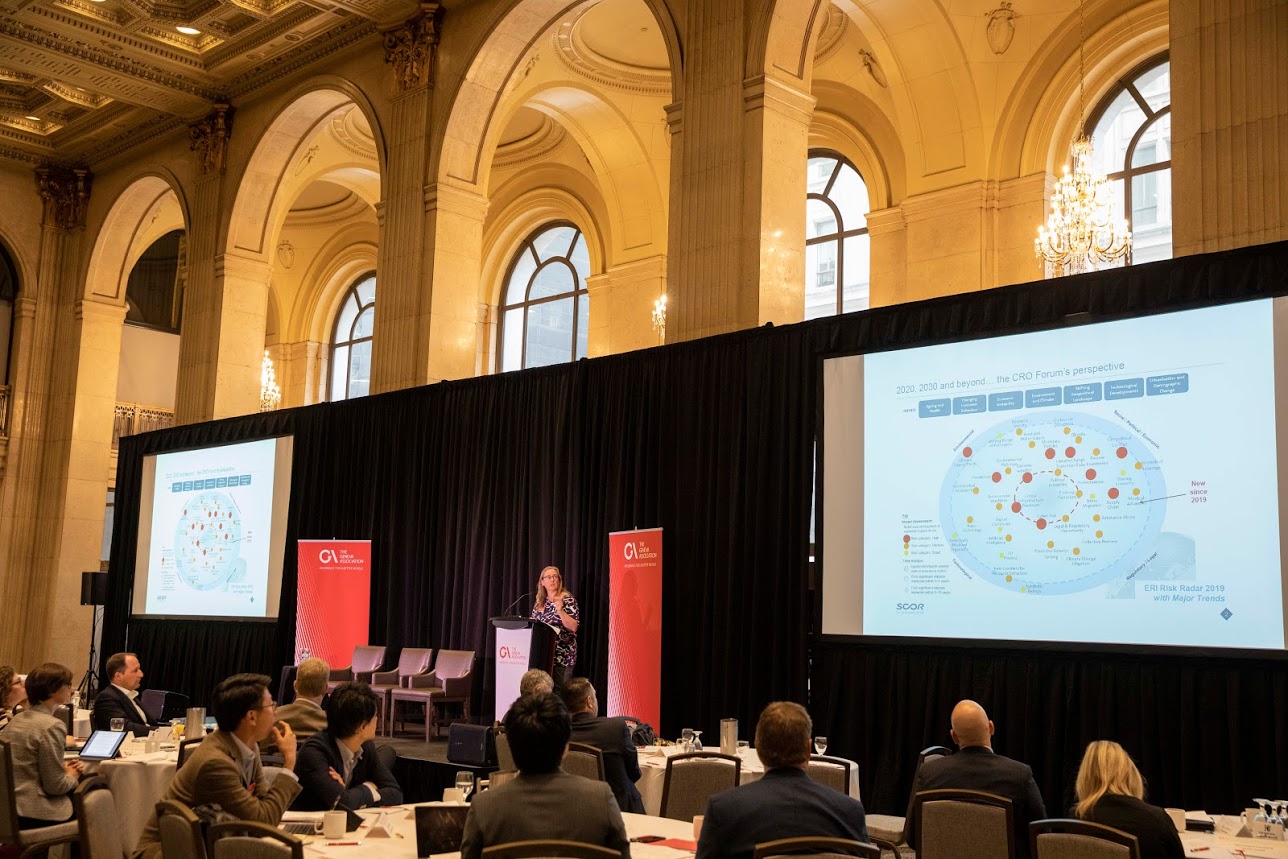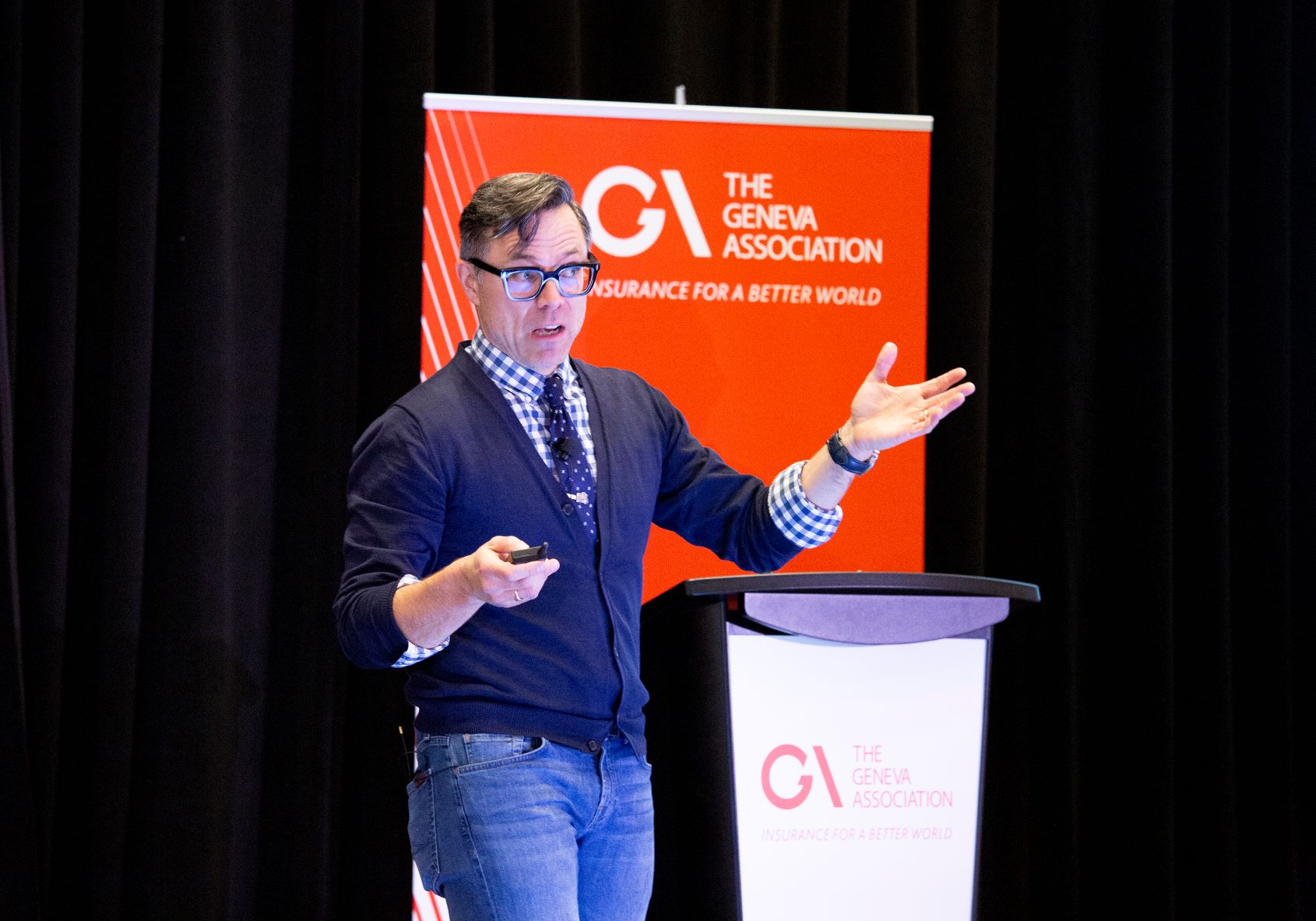Toronto, US, kindly hosted by RGA
Are We Prepared for 2020 ... 2030 ... Beyond?
The 16th Annual Global Ageing Conference of The Geneva Association dissected the most relevant trends in mortality and longevity risk. Insurers have a role to play not only in managing these risks through risk transfer, but in promoting services that can help society mitigate them.
With regard to longevity, insurers can make a direct contribution to helping individuals manage their finances and be prepared for retirement by addressing the pension savings gap. The longevity risk profiles of pension funds are a good match for life insurers. Hence, pension risk transfer is a significant growth opportunity for them.
Managing these risks exposes the limits of automation and disruption.There are no substitutes for human interaction: patients value the interface with their doctors; financial planning professionals are more successful in engaging and advising customers than digital platforms.
The conference concluded with two signature sessions. ‘World Café’ distilled the conference’s key findings and messages via breakout groups. ‘View from Above’, a discussion with Jacques Goulet, President, Sun Life Canada, and Peter Schaefer, CEO, Hannover Re U.S., captured their executive views on topics like genetic testing, the state of the life insurance market and motivating employees.
Summary

Introductory address by John P. Laughlin, Executive Vice President, Global Financial Solutions, RGA
Mortality
The conference took a close look at three mortality risk factors in particular: dementia, obesity and opioid use. It also looked critically at some emerging therapies – some promising and others less so.
Dementia: The number of people living with dementia, defined as the impairment of memory and at least one other cognitive domain, is projected to increase 181% by the year 2050.[1] From a medical perspective, the path of physiology is not well understood and there are opportunities to improve early diagnosis using bio markers.

Session on 'Dementia: Preparing for the Future': Liam Kaufmann, Co-founder and CEO, Winterlight Labs; Tim Meagher, Medical Director, Munich Re; and Matt Singleton, Ageing Lead, Swiss Re
Genetic and environmental risk factors for dementia have been identified, and dementia risk could be reduced by staying socially active, addressing hearing loss and prioritising a healthy lifestyle – eating well, not smoking, drinking in moderation and maintaining a healthy weight.
Opioids: In the United States age-adjusted mortality rates from opioids have worsened (3 to 15 per 100,000 people) since 1999; during the same period mortality rates from cancer in the U.S. have improved (220 to 160 per 100,000 people).[2] There is increasing evidence that mortality rates from opioid use are higher in populations where education and income levels are lower.
Obesity: There are now more obesity-related deaths than from opioids and motor vehicles. Obesity rates doubled between 1980 and 2014, with the prevalence of obesity approaching 40% in the U.S., though there was a 36% decrease in cases of diabetes between 2006 and 2014. There are 13 types of cancer associated with obesity.[3]
Science versus hearsay

Session on 'Competing Drivers to Longevity': Irene Merk, Head of Emerging Risks, SCOR Global Life
Improvements in medical technologies are enhancing health services during all three stages of patient interaction:
1) Prevention – genetic and epigenetic information, wearable devices, telemedicine, vaccines
2) Diagnosis – medical imaging, lab-on-a-chip, liquid biopsy, telemedicine
3) Treatment – robotic surgery, augmented reality, artificial organs, immune-oncology, CAR-T cell therapy
Liam Kaufman, CEO of Winterlight Labs, explained their developing technology that uses speech and AI to build disease-specific digital biomarkers and endpoints. Analysing patterns in writing and speech, for characteristics like low idea density, makes it possible to diagnose dementia earlier and more accurately.
A presentation on Ageing Gracefully by Tim Caulfied, Professor at the University of Alberta and best-selling author on health and wellness topics, disputed the effectiveness of many health and beauty remedies. The industry is booming: gluten-free products, bottled water, cryotherapy, stem cell treatments and vampire facials, to name a few. But there is little scientific evidence that these trends promote health or longevity. Proven, positive correlations with health and longevity are familiar ones: maintaining a healthy weight, eating ‘real food’, getting sufficient exercise and sleep and following the recommended vaccine regimen.

Timothy Caulfield, Professor of Law, University of Alberta, presents on 'Ageing Gracefully'
Longevity
The conference addressed longevity from the perspective of longer lifespans and in the context of changing medical care and a declining number of defined-benefit pension plans.
Jon Sabes, CEO of Life Epigenetics, Inc., explained that understanding the genetic correlation between ageing and disease can improve health predictions for the benefit of individuals and insurers alike. Using the ‘Horvath Clock’, a biochemical test that can measure human ageing through epigenetic signatures, new methods are being developed for collecting epigenetic data that match traditional underwriting factors – an innovation that could enable life insurers to underwrite longevity products more precisely.
Defined-benefit pension plans, or employer-sponsored retirement plans, are in decline. Pension risk transfer is a way for providers to offload some or all of the plan’s risk. Characteristics of pension-risk transfer markets vary, with more volume in the U.K. than in the U.S. due to regulation, accounting transparency and longevity risk awareness. Reinsurers are an important part of the pension risk transfer ‘deal ecosystem’, enabling scale and affordability.

Mick Moloney, Oliver Wyman; Amy Kessler, Prudential Retirement; and David Lipovics, RGA
The shift away from defined-benefit pension plans is part of a movement to shift the burden of retirement planning to individuals, contributing to an estimated retirement savings gap of $70 trillion across the eight largest pension markets.[4]
‘View from Above’
The conference concluded with a fireside chat with Jacques Goulet, President, Sun Life Canada and Peter Schaefer, CEO, Hannover Re U.S. On the topic of genetic testing, diagnostic testing has potential benefits that are in the best interest of the customer, such as individualised medicine. Predictive testing is more sensitive because what counts as ‘useful information’ may be subject to interpretation and results could affect reproductive decisions, among other ethical issues. Related technologies are rapidly evolving, and the role of genetics in medicine will look very different in 5-10 years.

Peter Schaefer, CEO, Hannover Life Re U.S.; Jacques Goulet, President, Sun Life Canada; and Ronnie Klein, GA Collaborating Expert in a fireside chat
A brief comparison of life insurance markets in the U.S. and Canada finds that fewer life insurance policies are being sold in both countries; however, the U.S. is experiencing flat sales overall, while sales figures in Canada are up due to increased premiums per policy. In order to stimulate demand, insurers should move toward simplifying both their products and the experience of life insurance for customers. Brokers are still valuable in advising customers on pensions and savings and breaking down the complexity of financial planning for retirement.
The conversation highlighted that insurers’ business strategies should accommodate not just shareholders, but should strike a balance between the interests of shareholders, employees, clients and communities. Insurance employers need to offer flexibility, putting less emphasis on facetime and more on helping employees achieve work-life balance. Policies to promote diversity and inclusion have become standard.
Retaining talent and building a next generation of leaders means keeping employees inspired and motivated. Companies should raise employee awareness of the purpose-driven nature of insurance – helping customers address some of their biggest challenges and making a difference in their lives.
[1] Alzheimer’s Disease International, 2015.
[2] Society of Actuaries (SOA), U.S. Population Mortality Observations, June 2019.
[3] Social Security Administration, Mortality by Career-average Earnings Level (Actuarial Study #124); SOA Individual Life mortality studies; SOA Pension mortality studies.
[4] Wikimedia Commons. https://commons.wikimedia.org/w/index.php?title=File%3AAdult_Obesity-CDC....






